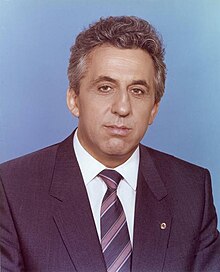
Back Egon Krenz Afrikaans ايكون كرينز Arabic ايكون كرينز ARZ Эган Крэнц Byelorussian Egon Krenz Catalan Egon Krenz Czech Egon Krenz Danish Egon Krenz German Έγκον Κρεντς Greek Egon Krenz Esperanto
Egon Krenz | |||||||||||||
|---|---|---|---|---|---|---|---|---|---|---|---|---|---|
 Official portrait, 1984 | |||||||||||||
| General Secretary of the Socialist Unity Party | |||||||||||||
| In office 18 October 1989 – 3 December 1989 | |||||||||||||
| Deputy | |||||||||||||
| Preceded by | Erich Honecker | ||||||||||||
| Succeeded by | Gregor Gysi (as Chairman) | ||||||||||||
| Chairman of the State Council | |||||||||||||
| In office 24 October 1989 – 6 December 1989 | |||||||||||||
| Preceded by | Erich Honecker | ||||||||||||
| Succeeded by | Manfred Gerlach | ||||||||||||
| Chairman of the National Defense Council | |||||||||||||
| In office 18 October 1989 – 6 December 1989 | |||||||||||||
| Secretary | |||||||||||||
| Preceded by | Erich Honecker | ||||||||||||
| Succeeded by | Office abolished | ||||||||||||
| First Secretary of the Free German Youth | |||||||||||||
| In office 9 January 1974 – 1 December 1983 | |||||||||||||
| Second Secretary |
| ||||||||||||
| Preceded by | Günther Jahn | ||||||||||||
| Succeeded by | Eberhard Aurich | ||||||||||||
| Chairman of the Ernst Thälmann Pioneer Organisation | |||||||||||||
| In office 8 February 1971 – 9 January 1974 | |||||||||||||
| Preceded by | Werner Engst | ||||||||||||
| Succeeded by | Helga Labs | ||||||||||||
| |||||||||||||
| Central Committee Secretariat responsibilities[2] | |||||||||||||
| 1983–1989 | Youth | ||||||||||||
| 1983–1989 | Sport | ||||||||||||
| 1983–1989 | Security Affairs | ||||||||||||
| 1983–1989 | State and Legal Affairs | ||||||||||||
| Personal details | |||||||||||||
| Born | Egon Rudi Ernst Krenz 19 March 1937 Kolberg, Province of Pomerania, Free State of Prussia, Nazi Germany (now Kołobrzeg, Poland) | ||||||||||||
| Political party | Independent | ||||||||||||
| Other political affiliations | Socialist Unity Party (1955–1990) | ||||||||||||
| Spouse |
Erika Krenz
(m. 1961; died 2017) | ||||||||||||
| Children | 2 | ||||||||||||
| Residence | Dierhagen | ||||||||||||
| Occupation |
| ||||||||||||
| Awards | |||||||||||||
| Signature | |||||||||||||
| Criminal information | |||||||||||||
| Criminal status | Served prison sentence 13 January 2000 – 18 December 2003, released on parole until 2006 | ||||||||||||
| Conviction(s) | Manslaughter (4 counts) | ||||||||||||
| Criminal penalty | 6½ years imprisonment | ||||||||||||
Central institution membership
Other offices held
| |||||||||||||
| Leader of East Germany | |||||||||||||
Egon Rudi Ernst Krenz (German pronunciation: [ˈeːgɔn ˈkʁɛnts]; born 19 March 1937) is a German former politician who was the last Communist leader of the German Democratic Republic (East Germany) during the Revolutions of 1989. He succeeded Erich Honecker as the General Secretary of the ruling Socialist Unity Party of Germany (SED) but was forced to resign only weeks later when the Berlin Wall fell.[3]
Throughout his career, Krenz held a number of prominent positions in the SED. He was Honecker's deputy from 1984 until he succeeded him in 1989 amid protests against the regime. Krenz was unsuccessful in his attempt to retain the Communist regime's grip on power. The SED gave up its monopoly of power some weeks after the fall of the Berlin Wall, and Krenz was forced to resign shortly afterward. He was expelled from the SED's successor party on 21 January 1990.[4] In 2000, he was sentenced to six and a half years in prison for manslaughter for his role in the Communist regime. After his release from prison in 2003, he retired to the small town of Dierhagen in Mecklenburg-Vorpommern. He remained on parole until the end of his sentence in 2006.[5] Together with Karel Urbánek from Czechoslovakia, Krenz is the last former General Secretary from the Eastern Bloc still alive.
- ^ Schmidt, Arthur. "Volkskammer der Deutschen Demokratischen Republik 1986-1990, Seite 39". gvoon.de. Retrieved 7 May 2022.
- ^ "Büro Egon Krenz im ZK der SED" (in German). Retrieved 28 October 2023.
- ^ Berlin, Oliver Moody (6 November 2019). "East Germany's last dictator defends communist dream to the end" – via The Times.
- ^ The Rise and Fall of a Socialist Welfare State: The German Democratic Republic (1949–1990) and German Unification (1989–1994). Springer Science & Business Media. 15 November 2012. p. 23. ISBN 978-3-642-22528-4.
- ^ Cite error: The named reference
rosenbergwas invoked but never defined (see the help page).
© MMXXIII Rich X Search. We shall prevail. All rights reserved. Rich X Search